March 18, 2015
Edited by David Sanders
Specimen Days
1548 – Cornelis Ketel, Dutch portrait painter/poet, is born.
1590 – Manuel de Faria e Sousa, Portuguese historian and poet (d. 1649), is born.
1840 – William Cosmo Monkhouse, English poet and critic (d. 1901), is born.
1842 – Stéphane Mallarmé, French poet (d. 1898), is born.
1864 – Karl M Lybeck, Finnish/Swedish language poet (Samlade Arbeten), is born.
1892 – Robert P Tristram Coffin, poet/reporter (WW II), is born.
1893 – Wilfred Owen, England, anti-war poet (Anthem for Doomed Youth), is born.
1904 – Srečko Kosovel, Slovenian poet (d. 1926), is born.
1932 – John Updike, Shillington Pa, poet/novelist (Rabbit Run), is born.
1975 – Alain Grandbois, Quebec poet (b. 1900), dies.
1992 – Cornelis B Vaandrager, [C Vaan], poet (Giant of Rotterdam), dies at 56.
1996 – Alepoude Odysseus Elytis llis, poet, dies at 84.
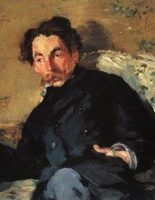
No sunset, but the red awakening
Of the last day concluding everything
Struggles so sadly that time disappears,
The redness of apocalypse, whose tears
Fall on the child, exiled to her own proud
Heart, as the swan makes its plumage a shroud
For its eyes, the old swan, and is carried away
From the plumage of grief to the eternal highway
Of its hopes, where it looks on the diamonds divine
Of a moribund star, which never more shall shine!
—from "Hérodiade" by Stéphane Mallarmé (1842–1898)
“No sunset, but the red awakening / Of the last day concluding everything / Struggles so sadly that time disappears,” — Stéphane Mallarmé
World Poetry
15 Years in Prison for a Poem! Welcome to Qatar
He wrote a poem. Recited it in his apartment to a group of seven people. Unknown to him, the poem was recorded and uploaded on YouTube. That was in 2011. Now he sits in prison in Qatar, serving a prison sentence of 15 years! He is Mohammed al-Ajami: a poet, a prisoner of conscience. Fifteen years in prison for a poem? Welcome to Qatar — an Island of contradiction. One can be excused for thinking that this tiny emirate, considered the world's richest country per capita, would be more tolerant of a dissenting opinion. After all it stood alone in its support of the Arab uprisings that flooded the MENA region since 2011.
Documenting Diaspora in Poetry

Poet Tirtha Sangam Rai, popularly known as “Registhani Kabi”, or the poet of the desert, entertained the audience with his poems about the Nepali diaspora during a programme organised in Jhiljhile, Jhapa, on Wednesday. The programme was organised by Satashi Weekly and was chaired by renowned poet Shrawan Mukarung.
"When All The Others Were Away at Mass" Tops Favourite Poem Poll
The poem "When All The Others Were Away at Mass" [from Clearances III – In Memoriam M.K.H., 1911-1984] by Seamus Heaney has been named Ireland’s favourite poem of the last 100 years. The poem, which recalls a morning shared between the young author and his mother, peeling potatoes, topped an RTÉ poll to identify the best loved Irish poem of the past century. Heaney’s son, Mick, said it was an honour for the poem to have been chosen as Ireland’s favourite.
Poet Tirtha Sangam Rai, popularly known as “Registhani Kabi”, or the poet of the desert, writes about the Nepali diaspora.
Recent Reviews
Citizen: An American Lyric
by Jordan Davis
Therapy is exhausting. Bringing everything that is uppermost out for someone you pay to respond makes you doubly vulnerable — you relive traumas instead of repressing them, and you rely on a guide for empathy and reason as they support your attempt to make sense of what happens to you and how to change it. Not only do you voluntarily re-experience pain, but also your guide may well resemble a source of your traumas.
The Beautiful Librarians by Sean O’Brien
by Carol Rumens
In the title poem of Sean O’Brien’s new collection, The Beautiful Librarians, present-day social reality (punitive funding cuts to the UK’s library services) may help power both the nostalgia and the political critique. Time has been called on a particular kind of postwar social vision, honeycombed, for the speaker, by the memory of delight in the liberated horizons a local library made accessible.
Ekphrastic Vistas: Poetry and the Portrait
On Likenesses, by Judith Aronson
by Rachael Boast
In February 2014 the Bristol Poetry Institute set up a poetry competition in collaboration with the Royal West of England Academy. This was the first collaboration of its kind and the occasion was the opening of Likenesses, an exhibition of photographic portraits by Judith Aronson, former photographer for the Sunday Telegraph, whose work is held in many private and public collections, including the National Portrait Gallery in London. The exhibition, which ran from 8 February to 20 March, gave rise to a number of related events, including a poetry masterclass on the theme of ekphrasis (works of art that transform one art form into another), a public talk by Aronson in the gallery, and an evening of readings of poems or prose extracts from the authors who featured in Aronson’s exhibition, read by University of Bristol staff and students to a full house in the RWA’s Cube Gallery.
In Sean O’Brien’s new collection, The Beautiful Librarians, present-day reality powers both nostalgia and political critique.
Broadsides
Race and the Poetic Avant-Garde
by Stefania Heim
Harryette Mullen wrote in 1996, “The assumption remains, however unexamined, that ‘avant-garde’ poetry is not ‘black’ and that ‘black’ poetry, however singular its ‘voice,’ is not ‘formally innovative.’” Mullen’s own opus was being torn down the middle, with particular writings received as speaking for black female experience and others as examples of formal innovation. She concludes by articulating the stakes of such shallow and myopic divisions: “I hope that my work continues to challenge that deadly distinction between ‘blackness’ and ‘humanity’ – or ‘universality’ – that is still imposed on black human beings.”
The Ferocity of Festivals
by Helena Nelson
When I was young poetry festivals didn’t exist. After several days at StAnza last week, talking and listening, and reading and milling around, and the lovely subsequent ripples through blogs, FaceBook, Twitter, and so on, it’s hard to believe. The late twentieth and twenty-first century so far have seen horrendous wars, and they continue. But also there have been festivals. More and more of them. When did arts festivals start? In 1969, there were distant reverberations about something called ‘Woodstock’. I was 16, and it had nothing to do with me. There was a record. There were hippies. It was music. There was flower power. All somewhere else. But the word ‘festival’ seeped through, and nothing to do with church and harvests.
“The assumption remains, however unexamined, that ‘avant-garde’ poetry is not ‘black.’” –Harryette Mullen
Drafts & Fragments
Epic Poem Beowulf Heading to TV
by Nathalie Caron

A new re-imagining of Anglo-Saxon epic poem Beowulf is heading to TV, boasting quite the stellar cast. Deadline reports that Da Vinci’s Demons actor Kieran Bew has been cast in the lead role of the mighty heroic warrior, Beowulf, who battles and slays Grendel, a terrifying monster that roamed and terrorized the mythical Shieldlands during Britain's Dark Ages, spurring the creature’s mother into a deadly, bloody attack.
Poetry In the News
2014 National Book Critics Circle Award Winners Announced

Claremont poet Rankine won the poetry award for "Citizen," a collection that reflects on racism, community and American identity. Rankine was also nominated in the criticism category for the volume, marking the first time in the history of the awards that a book was a finalist in two different categories.
Death Threat For Michael Brown Autopsy Poem — Kenneth Goldsmith Responds

A controversy has recently arisen over a poetic work that a well-known poet named Kenneth Goldsmith wrote based on the autopsy of Michael Brown. As the injustices surrounding Michael Brown’s death are being addressed, the latest in the Michael Brown and Ferguson issue has been a long list of resignations. Most Americans take the incidents surrounding Michael Brown’s death very seriously, and some are saying that Kenneth Goldsmith crossed the line with his poem based on Michael Brown’s autopsy.
Teacher Suspended for Reading Racy Allen Ginsberg Poem
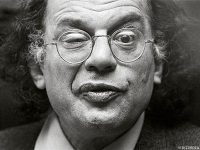
A Connecticut high school has suspended a teacher for reading an Allen Ginsberg poem to his class. The poem, “Please Master,” includes detailed descriptions of sex acts between two men, which parents and school administrators have called “highly inappropriate,” according to local TV station WTNH.
Claremont poet Rankine won the poetry National Book Award for “Citizen,” a collection that reflects on racism, community and American identity.
New Books
Poetry in Medicine: An Anthology of Poems About Doctors, Patients, Illness and Healing edited by Michael Salcman
[Paperback] Persea, 400 pp., $24.95
Infused with hope, heartbreak, and humor, this book gathers our greatest poets from antiquity to the present, prescribing new perspectives on doctors and patients, remedies and procedures, illness and recovery. A literary elixir, Poetry in Medicine displays the genre’s capacity to heal us. Contributors include Auden, Baudelaire, Berryman, Blake, Bishop, Boland, Campo, Cavafy, Clampitt, Chaucer, Clifton, Cummings, Dickinson, Donne, Conan Doyle, Eliot, Frost, Gunn, Hall, Hass, Hayden, Hirsch, Heaney, O. W. Holmes, Kooser, Larkin, Longfellow, Lowell, Merrill, Milne, Milton, Nash, Ovid, Pinsky, Plath, Rilke, Shakespeare, Seshardi, Sexton, Stevens, Szymborska, Whitman, Williams, Yeats, et al.
Blood Work by Matthew Siegel
[Paperback] University of Wisconsin Press, 76 pp., $17.95
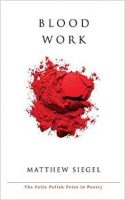
Blood Work reveals what happens to the self when the body is compromised by illness. These poems explore the struggle to remain whole in the shadow of Crohn’s disease and to make a home for oneself in the body and in the world.
Elegy for a Broken Machine: Poems by Patrick Phillips
[Hardcover] Knopf,80 pp., $26.00
The poet Patrick Phillips brings us a stunning third collection that is at its core a son’s lament for his father. This book of elegies takes us from the luminous world of childhood to the fluorescent glare of operating rooms and recovery wards, and into the twilight lives of those who must go on. In one poem Phillips watches his sons play “Mercy” just as he did with his brother: hands laced, the stronger pushing the other back until he grunts for mercy, “a game we played // so many times / I finally taught my sons, // not knowing what it was, / until too late, I’d done.” Phillips documents the unsung joys of midlife, the betrayals of the human body, and his realization that as the crowd of ghosts grows, we take our places, next in line. The result is a twenty-first-century memento mori, fashioned not just from loss but also from praise, and a fierce love for the world in all its ruined splendor.
Hive by Christina Stoddard
[Paperback] University of Wisconsin Press, 80 pp., $17.95
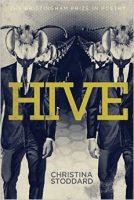
Hive is a remarkable debut collection of poems about brutality, exaltation, rebellion, and allegiance. Written in the voice of a teenage Mormon girl, these poems chronicle an inheritance of daily violence and closely guarded secrets. A conflicting cast of recurring characters—best friends, sisters, serial killers, and the ominous Elders—move through these poems as the speaker begins to struggle with the widening gulf between her impulse toward faith and her growing doubts about the people who claim to know God’s will. Ultimately she must confront what it means to believe and what it costs to save ourselves.
Mr. West by Sarah Blake
[Hardcover] Wesleyan, 128 pp., $24.95
Mr. West covers the main events in superstar Kanye West’s life while also following the poet on her year spent researching, writing, and pregnant. The book explores how we are drawn to celebrities—to their portrayal in the media—and how we sometimes find great private meaning in another person’s public story, even across lines of gender and race. Blake’s aesthetics take her work from prose poems to lineated free verse to tightly wound lyrics to improbably successful sestinas. The poems fully engage pop culture as a strange, complicated presence that is revealing of America itself. This is a daring debut collection and a groundbreaking work.
Heliopause by Heather Christle
[Hardcover] Wesleyan, 112 pp., $24.95
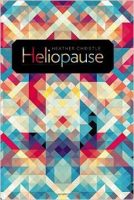
Heather Christle’s stunning fourth collection blends disarming honesty with keen leaps of the imagination. Like the boundary between our sun’s sphere of influence and interstellar space, from which the book takes its name, the poems in Heliopause locate themselves along the border of the known and unknown, moving with breathtaking assurance from the page to the beyond. Christle finds striking parallels between subjects as varied as the fate of Voyager 1, the uncertain conception of new life, the nature of elegy, and the decaying transmission of information across time. Nimbly engaging with current events and lyric past, Heliopause marks a bold shift and growing vision in Christle’s work.
Blood Work by Matthew Siegel reveals what happens to the self when the body is compromised by illness.
Correspondences
Interview with Poet Jane Hirshfield
By Anisse Gross
Jane Hirshfield, the author of eight books of poetry and two essay collections, has two books out from Knopf this month: “The Beauty: Poems” (107 pages; $26) and “Ten Windows: How Great Poems Transform the World” (310 pages; $24.95). In “The Beauty,” the celebrated poet — whose honors include the Poetry Center Book Award, fellowships from the Guggenheim and Rockefeller foundations, the National Endowment for the Arts, and the Academy of American Poets — brings new eyes to her surroundings, examining both our interior and exterior worlds. It is an exquisite collection that displays her talents of observation and her willingness to look at life through the lens of hindsight. “Ten Windows” is a follow-up to Hirshfield’s collection “Nine Gates.” She offers close readings of the lines of famous poems and looks at how we live hidden lives and long to be seen. In an interview at her home in Marin County, Hirshfield shared her insights into the longevity of art, the weight of a life and the secret to understanding poetry.
Tony Harrison: Still Open for Business
by Stephen Moss

This week Tony Harrison was awarded the David Cohen prize, a sort of literary lifetime achievement Oscar that goes only to the most gilded writers – Naipaul, Pinter, Lessing, Mantel and so on. He is very much still writing, and has a long, lyrical poem in a recent issue of the London Review of Books called “Polygons”, which chimes with the consideration of a life’s work prompted by the prize. “It’s a poem,” says Harrison, “reflective of creativity and mortality.”
Tony Harrison was awarded the David Cohen prize.
Envoi: Editor’s Notes
Lessons from the Past: Randall Jarrell
"Many writers have felt, like Pound: Why not invent an art form that will permit me to put all my life, all my thoughts and feelings about the universe, directly into a work of art? But the trouble is, when they've invented it it isn't an art form. The Cantos are a "form" that permits Pound not even to try to write poetry; but since he is a poet, a wonderful one, he sometimes still writes it."
—from "Five Poets" in Kipling, Auden, & Co.
“Many writers have felt, like Pound: Why not invent an art form that will permit me to put all my life, all my thoughts and feelings about the universe, directly into a work of art?” —Randall Jarrell